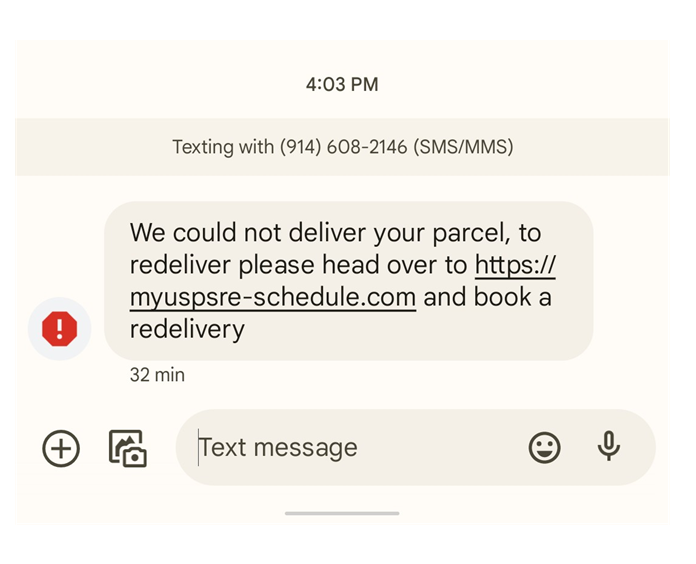Delivery Scams

Delivery scams, often impersonating reputable carriers such as USPS, FedEx, or UPS, involve deceptive phone
or email notices claiming a package delivery failure to your address. Unexpected alerts about your account
could be a fraud.
These scams aim to trick recipients into providing sensitive information, including personal details,
financial information, or passwords for mail service websites.
Scammers sometimes attempt to coerce victims into paying upfront fees for a service they will never receive.
Signs of Delivery Scams
- Urgent Messages: Scammers create a sense of urgency, claiming immediate action is required to avoid consequences.
- Unsolicited Communications: Be cautious of unexpected emails or messages about failed deliveries, especially if you didn't recently order a package.
- Request for Personal Information: Legitimate delivery services rarely ask for personal or financial information through unsolicited emails or texts.
Prevention Tips
- Verify Directly: Instead of clicking on links in emails or texts, go directly to the official website of the delivery service by typing the URL in your browser. Confirm there are no suspicious shipping or billing activities by logging into the delivery service using a known reliable website, not one provided by the suspicious notice.
- Check Tracking Numbers: Legitimate carriers provide tracking numbers. Verify the authenticity of a message by cross-referencing the tracking number on the official website. Don't use the links that the scammer conveniently gives you.
- Contact the Carrier: If in doubt, contact the carrier directly using contact information from their official website. They can confirm whether there are any issues with your delivery.
Recovering from this scam
- Forward suspicious texts to 7726 (SPAM) to alert your carrier. Visit your carrier's web page for other channels for reporting fraudulent activities.
- Notify the shipping company about the fraudulent message.
- Delete the text from your phone.
- If you provided passwords, change them immediately. Use strong, unique passwords for each account.
- Keep a close eye on your bank and email accounts for suspicious activities. Report any unauthorized transactions promptly.
References:
- Federal Trade Commission (FTC). (2022 September). How to Recognize and Avoid Phishing Scams. Retrieved from https://www.consumer.ftc.gov/articles/how-recognize-and-avoid-phishing-scams.
- Office of Consumer Protection (OCP), Montgomery County. (2024 December 10). Office of Consumer Protection Warns of U.S. Postal Service Package Tracking Text Scam. Retrieved from https://content.govdelivery.com/accounts/MDMONTGOMERY/bulletins/3c6899c.
- United Parcel Service (UPS). (n.d.). Protect Yourself From Fraud and Scams. https://www.ups.com/us/en/support/shipping-support/legal-terms-conditions/fight-fraud.page.

